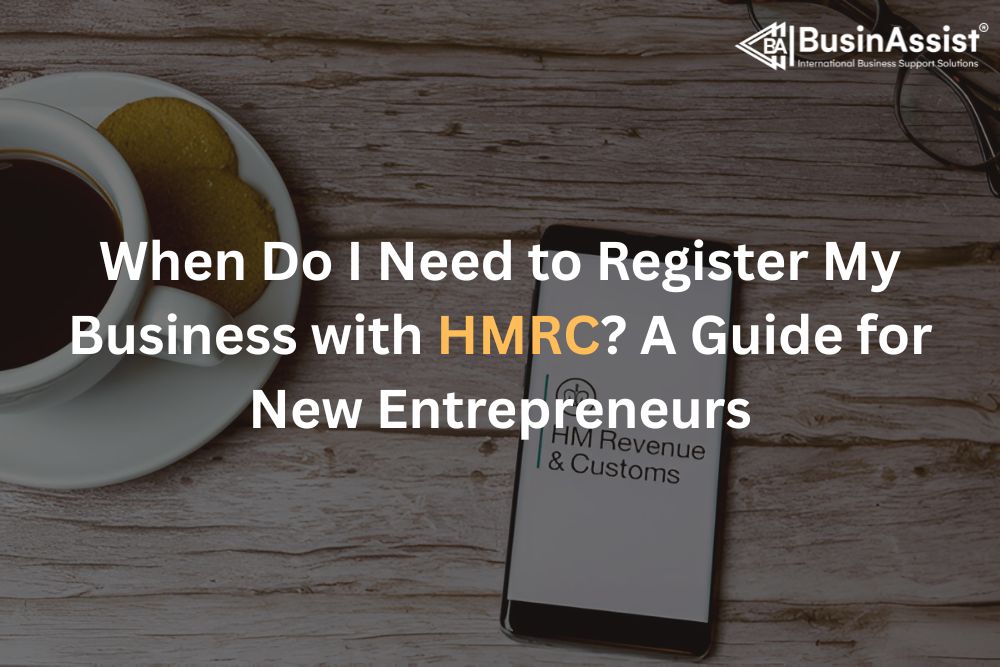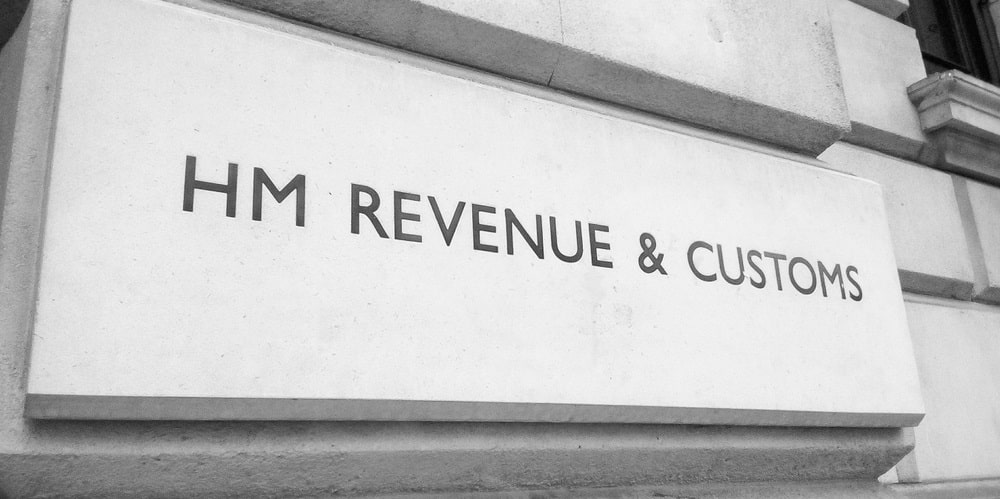Last Updated on December 17, 2025 by Joy Kyalo

Starting a business is exciting and complex, especially if you are a new entrepreneur. In the United Kingdom, one has to follow regulations when setting up a UK business, whether as a sole trader or a limited company.
BusinAssist helps entrepreneurs register their businesses in the UK, and the most frequently asked question is: When do you need to register your business with HMRC? Here is a guide for new entrepreneurs looking to start a business in the UK and their obligations to HMRC.
Key Takeaways
-
- Sole traders must register with HMRC once income exceeds £1,000, while partnerships, LLPs, and limited companies must register for tax after formation.
- Businesses crossing the £90,000 turnover threshold must register for VAT, and employers must set up PAYE before the first payday.
- Failure to register with HMRC can lead to penalties, back taxes, or even legal consequences, so timely registration is essential.
Who is HMRC?
Businesses in any jurisdiction must pay taxes to the government for the betterment of the country’s economy. There are government agencies or institutions set in place to receive and manage business and individual taxes. In the UK, HM Revenue and Customs (HMRC) is in charge of collecting and managing taxes for individuals and companies.
They are responsible for administering, collecting, enforcing, paying taxes, providing child benefits, and ensuring companies pay the minimum wage. The revenue collected from the tax payments is used to improve the lives of people by improving public services such as public schools, roads, hospitals, and communities.
Apart from administering, collecting, and paying taxes, HMRC is responsible for aiding in the facilitation of lawful international commerce, managing Statutory Payments, and keeping up with a large number of transactions.
Why should you register your business with HMRC?
Before we explore the question, ‘When do I need to register my business with HMRC?’ let us explore why your business should be registered with HMRC. They include:
Comply with tax laws:
Whether you are self-employed or have a registered business, you must comply with tax laws in the UK. Though sole traders do not register their business with Companies House, they are obligated to register with HMRC for Self-Assessment and National Insurance on their income.
Registered businesses must register with HMRC after company incorporation in UK and start paying taxes. Failure to comply with tax laws means your business will be fined, penalised, or even dissolved. In extreme cases, you may be legally implicated, which can damage your business reputation.
Complete tax returns:
To easily complete tax returns for your business, you must register with HMRC. Whether your company is trading or not, your role as a business owner to HMRC is to complete tax returns for the tax authority to understand and see how your company is performing.
As a sole trader, you will have to enroll for Self-Assessment and sign in to the online system to complete tax returns, and limited companies will have to file company tax returns and complete statutory annual returns.
Meet tax obligations:
If your business earns an income, you must register with HMRC to meet tax obligations. The word is income and not profits.
When do I need to register my business with HMRC?

When your sole trader business income exceeds £1,000
You can register with HMRC once you start the business or after your business starts earning more than £1,000. To avoid penalties and fines, it is crucial to register with HMRC before or when your business is about to exceed £1,000 in income.
For limited company formation
When incorporating a limited company in the UK, you must register with Companies House and HMRC. Depending on the method you use to register your company, you may automatically register with HMRC for Corporate Tax. If your company is not automatically registered, you must register your company within three months of any business activity.
Pro Tip: Register Early to Avoid Stress
Don’t wait until you cross income or VAT thresholds, registering with HMRC in advance ensures smooth operations, avoids last-minute rush, and protects you from costly penalties or compliance issues.
Partnership registration
All partners in a partnership have to register with HMRC for Self-Assessment. They will be filing their tax returns according to their income. A ‘nominated partner’ will be in charge of sending the partnership tax return.
To avoid being penalised or fined, you must register by the 5th of October in the second tax year of your business.
Registering Limited Liability Partnerships (LLPs)
Unlike partnerships, LLPs must register with Companies House and HMRC for Corporation Tax. Designated members must also register with HMRC for Self-Assessment, and they will be taxed individually.
Registering for VAT
Any business in the UK needs to register with HMRC for Value Added Tax (VAT) if their total taxable turnover for the last 12 months exceeds £90,000. Additionally, you must register within 30 days of the end of the month when you exceed the VAT threshold.
You will also need to register for VAT if you realise that your business will exceed the VAT threshold in the next 30 days. However, you must register by the end of those 30 days.
Businesses based in Northern Ireland that sell goods or services that are VAT-exempt but buy goods for more than £90,000 in any 12 months from EU VAT-registered suppliers to use in your business will have to register with HMRC for VAT.
If any business takes over a VAT-registered business, it will have to register for VAT if the combined taxable turnover of the new business and the existing one is over the threshold.
If you plan to hire employees
If you plan to hire employees for your company, you will have to register for Pay-As-You-Earn (PAYE). The employer must register with HMRC before the first payday. Getting the employer’s PAYE reference number can take 20 working days, so it is important to register 2 months before payday.
What are the consequences of not registering with HMRC?
Any businesses operating in the UK must register with HMRC. If they don’t, they will not have complied with regulatory laws. Other implications include:
Penalties: Your business will pay hefty fines, and additionally, you will have to pay any taxes that you have missed. The penalty can cost up to 100% of the tax owed, plus paying back your taxes.
Prison sentence: Depending on the severity of the issue, you could be subjected to a prison sentence. If you fail to register your business with HMRC, you may face financial penalties. You may also face a prison sentence depending on how much income you have not declared.
When do I have to register with HMRC? As mentioned above, every business needs to register with HMRC. Sole traders need to register with HMRC if their income exceeds £1,000. For partnerships and LLPs, every partner will need to register for Self-Assessment with HMRC and file tax returns separately. Limited companies will have to register with HMRC after the company is registered with Companies House.
Registering a business with HMRC can be complicated, however, you can take advantage of company formation agents like BusinAssist. We can fill out the paperwork for you and seamlessly get your business registered with HMRC and Companies House. We can also provide a UK virtual address to help you with the registration of your company and service address for your directors.
Ready to register your business with Business Assist? Contact us at info@businassist.com.
FAQs
Q: How to register an LTD company with HMRC?
Ans: To register a limited company with HMRC, you must register your company with Companies House. You can start by:
- Choose a name for your company that is unique and distinct. It should follow Companies House guidelines.
- Designate a UK registered office address.
- Appoint shareholders and directors
- Create a Memorandum of Association and Articles of Association
- Register with Companies House directly or use an accountant or company formation agent.
- Once the company is incorporated, you can register with HMRC for Corporate Tax.
Q: How to register as a sole trader with HMRC?
Ans: Create a Government Gateway user ID and set a password
Enter your details in the form, such as name, email address,
Q: How to register a second business with HMRC?
Ans: Self-employed people will have to complete one self-assessment tax return form and put in ‘2’ where it asks ‘How many self-employments have you had? For each business, fill in the self-employment form and input the relevant income/expenses associated with that business.
Q: Do sole traders need to register with HMRC?
Ans: Yes, sole traders must register with HMRC if their income exceeds £1,000.
Q: How to register a partnership with HMRC?
Ans: To register a partnership with HMRC, you will need to complete either:
- SA401 Registering a partner for Self Assessment and Class 2 and NICs for an individual partner
- SA402 Registering a partner for Self-Assessment if they’re not an individual – for example, the partner is a company, another partnership, or a trust
If the partners are already registered with HMRC for Self-Assessment, they will need to complete the partner registration form. To complete the form, you will have to fill out:
- The name of the partnership
- Address of partnership
- Phone number
- Trading name (if you use a different one from the registered name)
- Trading address if different from the registered address
- Business activities
- Date when the business commenced
- Type of partnership
- Company registration number (CRN) if the partnership is LLP or LP
- Partnership’s accounting date
- Name of nominated partner
- Correspondence address of the nominated partner
- The nominated partner’s Unique Taxpayer Reference (UTR)
Read Also:
- How Long Do You Have to Keep Records for HMRC? A Guide for UK Businesses
- What is an SA401 Form and How to Submit It to HMRC: A Complete Guide
- Can HMRC Access Your Bank Account? What Every Taxpayer Should Know
- Understanding HMRC Errors and Mistakes Guidance: Your Rights and Responsibilities
- Do I Need a Registered Business to Sell on Etsy? A Simple Guide for Beginners
- Do I Need a Registered Company to Sell on Amazon? A Guide for New Sellers
- How Can You Start a Business Without Money? Smart Strategies to Begin

Joy is a content writer at BusinAssist with 6+ years of experience in content marketing and social media strategy. She specialises in company formation and virtual operations, guiding entrepreneurs through global markets with clarity, drawing on her marketing and PR background. Business Assist with BusinAssist – your business success partner.


